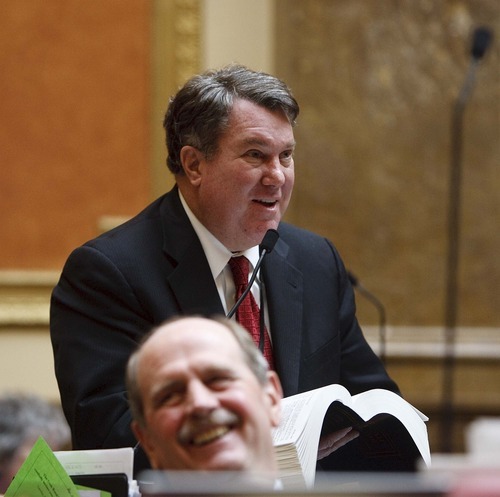This is an archived article that was published on sltrib.com in 2011, and information in the article may be outdated. It is provided only for personal research purposes and may not be reprinted.
It is virtually impossible for homeowners trapped in a foreclosure process to try to renegotiate the terms of their loans, said the president of the Utah Bankers Association on Tuesday.
Howard Headlee said bills before the Utah Legislature aimed at addressing the foreclosure wave rolling across the state aren't practical in today's marketplace, where home loans are almost immediately sold by the original lenders and might be resold many times over before ending up in the hands of "hundreds, if not thousands" of investors, who each own a fraction.
"It's kind of like unscrambling an egg," said Headlee of the legislative effort to require owners of mortgage notes to identify a single person with whom a borrower in foreclosure could try to renegotiate terms of their loan.
The bankers' opposition clouds chances of passage for HB326, sponsored by Rep. LaVar Christensen, R-Draper. But Christensen said the language is still under discussion and changes are likely to address bankers' concerns.
At the end of 2010, more than 10,000 properties in the state were in the foreclosure process, the result of the bursting of the real-estate bubble that was brought on, in part, by bankers loosening lending standards and unilaterally orchestrating changes in property recording procedures.
Christensen said he's been contacted by numerous people about foreclosures who are frustrated because they can't make even minimal contact with the owner of their mortgages. His bill would require that when servicers of the loan initiate foreclosure proceedings, they must identify who could enter into mediation with a homeowner and approve any loan modifications. Foreclosures could be postponed for three months.
"I personally believe this is one of the most important and practical and necessary things that we can do during this session," Christensen said Monday. "It would be most unfortunate if the session ended and we weren't able to offer some relief in this most fundamental area to the people of Utah."
Headlee said that even though some mortgages have been modified in recent years, the fracturing of ownership of the actual notes makes renegotiation largely impossible. Servicers of those loans, mostly banks, are locked into agreements that severely restrict what they can do, he said.
"Millions of mortgages have been modified, but those have required herculean effort," he said. "There just has to be a recognition there are some for which modification is not an option."
He said the latter includes almost all existing mortgages.
Chris Kyler, CEO of the Utah Association of Realtors, said he participated in a recent meeting involving legislators, bankers, attorneys and others who couldn't come to consensus on what the bill should say.
"The Realtors clearly recognize this as a significant and real challenge, both here in Utah and nationwide," he said, adding that the legislation is "a moving ball" and "we're at the table as an interested party."
Abraham Bates, an attorney who has filed more than 100 lawsuits over foreclosures, said other states such as Nevada have successfully implemented foreclosure mediation procedures. Bates has been working with Sen. Ben McAdams, D-Salt Lake City, in proposing a more comprehensive set of measures to help homeowners deal with payment issues before foreclosures begin and has been in contact with Utah Realtors seeking their support.
But McAdams' bill has yet to emerge.
Headlee warned that, as written, Christensen's bill would impose requirements that could lead some lenders to exit the state or make home loans more difficult and costly to obtain.
A bill by Rep. Susan Duckworth, D-Magna, HB457, would require that a change in ownership of a mortgage note be recorded at a county recorder's office within 10 days. That's a response to a company called Mortgage Electronic Registration Systems Inc., created in the mid-1990s by the Mortgage Bankers Association to serve as a database to record the ownership of mortgage notes instead of using the traditional method of registering the information with a county recorder. Christensen's bill contains similar language.



